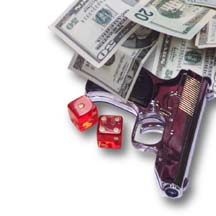
Game room insider
recalls tight securityA successful Chinatown parlor
doorman falls to a police
undercover sting operation
THIRD IN A SERIES
Steve Crouch testified in federal court last summer that he started out as an entry-level doorman before rising to become the No. 2 man in charge of protection of an illegal casino in Chinatown.
Crouch's testimony offered a rare glimpse into the security operations of illegal gambling rooms, the same business that escalated into a turf war that police said led to the Pali Golf Course shootings on Jan. 7 in which two men were killed and a third was critically injured.
Crouch was indicted along with 31 other people in a series of May 2000 raids by state and federal agents on seven locations stretching from Chinatown to Waianae.
The raid on the second floor of the Wo Fat building led to the indictment of Crouch on gambling and money laundering charges. Crouch pleaded guilty to both.
In testimony, Crouch said he worked for the No. 1 security man: Gabriel Aio, who at the time of the games was chief of security for Matson Navigation Co.
Aio admitted that as head of security for the casino, he was paid $2,000 a week.
Aio pleaded guilty to lesser charges and was sentenced to six months in federal prison.
The indictments stemmed from an intensive three-year investigation during which Detective Earl Koanui posed as a corrupt police officer who took bribes in return for warning gambling operations about police raids.
Aio was charged with paying $82,620 in bribes to Koanui.
Crouch, a nightclub owner, also pleaded guilty and is to be sentenced this month.
According to Crouch's testimony, the gambling room at 1152 Maunakea St. was open 24 hours a day. He testified that security "doormen" worked in four six-hour shifts and were paid $72 in cash for each shift.
Inside the game room, a separate security team of "spotters" watched for cheating or disorderly behavior. If fights broke out, the doormen responded.
"I started off as the security/doorman. I later became the guy that scheduled all the doormen, and then later I became the No. 2 guy on the protection/security side of the gambling," said Crouch.
"There were a number of guys that were hired by myself and Gabe Aio and from different factions. Either you had the Hawaiian local side or the Samoan side," he said.
Crouch explained that there were two electronic doors with television cameras and that the "doormen" watched TV monitors so they could screen who was trying to enter to make sure they were gamblers, or "players," and not police or rival groups.
"If the person met the profile of a gambler, he would push the buzzer" to let them in.
"You had different factions that were always trying to shut the game down. So, based on his (the doorman's) actions, you could either be busted for gambling or a robbery. If he did his job well, then the game would run smoothly."
Crouch explained that outsiders "can disrupt the game, they can start a fight, they can rob the game. In one occasion they broke the Buddha that kind of controls the luck for the game."
Crouch told the court that their operation "was probably the most successful gambling game out of all the games in Chinatown."
